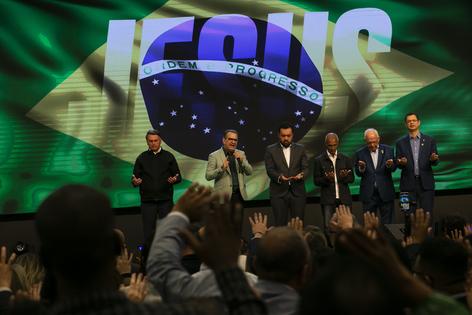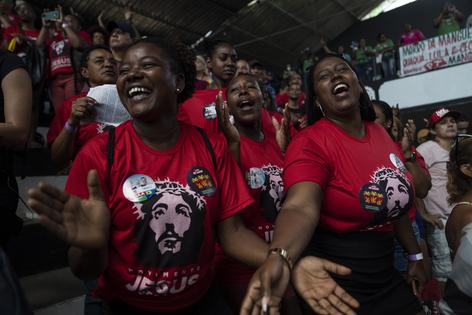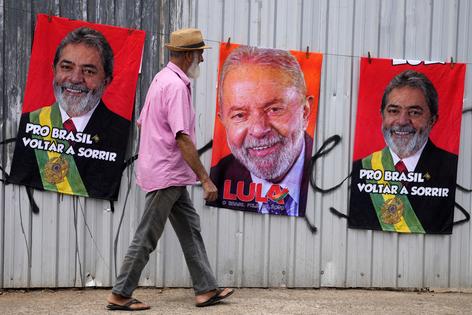Religion is shaping Brazil's presidential election – but its evangelicals aren't the same as America's
Published in News & Features
With one week to go before Brazil’s presidential election, the two front-runners are battling for the religious vote.
Last month, first lady Michelle Bolsonaro told an evangelical church service that the presidential palace had been “consecrated to demons” under previous presidential administrations – a gibe against former president Luiz Inácio Lula da Silva, commonly known as Lula, and his center-left Workers’ Party.
Lula is running again in this year’s election, whose first round is Oct. 2, 2022, and has joined the fray. In his official campaign kickoff in August 2022, for instance, he alleged that the right-wing current president, Jair Bolsonaro, is “possessed by the devil.”
Lula has been heavily favored to win the election and retake the office he held from 2003 to 2010. In polls, he currently runs about 15 percentage points ahead of Bolsonaro.
Religious voters are an important part of the story. Bolsonaro – whom international media dubbed the “Trump of the Tropics” for his persona as a conservative firebrand, his anti-democratic streak, and his ability to attract a Christian base – garnered 70% of evangelical support in the 2018 election. Scholars, including me, argue that without the evangelical vote, he would have narrowly lost.
However, as a political scientist who has written a book about religious politics in Brazil, I see these comparisons between the U.S. and Brazil as also glossing over key differences. Yes, Bolsonaro and Trump are very similar in how they use religion. Yet the ways evangelical communities work and how religion shapes politics is different in each country – and my own research suggests that conservative Christians will not be as consistent a base for Bolsonaro as they are for Trump and the Republican Party.
One key difference is the language used: who “evangelicals” are in the first place.
In Latin America, traditionally a Catholic stronghold, the Spanish and Portuguese term “evangelico” is applied to nearly all non-Catholic Christians, including Protestant denominations that are usually classified as “mainline” or even “progressive” in the U.S. Estimates indicate that around a third of Brazilians identify as evangelical today, up from just a few percentage points in 1970. In the same period, the percentage of Catholics has fallen from over 90% to right about half.
By contrast, in the U.S. the term “evangelical” is reserved for theologically conservative Protestant groups, as well as Christians who have had a “born-again” experience of religious awakening. Americans also increasingly apply the term “evangelical” in a political sense, to refer to predominantly white political conservatives who are affiliated with Protestant churches.
As a result, the group of people termed “evangelicals” is much more diverse in Latin America than in the United States – and it’s politically quite diverse, too. All this said, many evangelicals in Brazil do have some tendency to adopt theologically conservative beliefs, such as interpreting the Bible literally.
A second major difference is the lack of strong partisan affiliation on Brazil’s religious right. Since the 1970s, many Americans are used to associating evangelicalism with the Republican Party. The founding of groups such as Jerry Falwell’s Moral Majority helped spur evangelicals to become a strong base for political conservatism.
However, there is no political party in Brazil that can claim such a strong link to evangelicals as a whole. Brazilian politics is famously fragmented, especially on the right, and there are dozens of parties in Congress at any given time. Many parties – mostly conservative ones – court evangelicals, but none have shored up strong loyalty across the wide spectrum of evangelical denominations and churches.
Jair Bolsonaro personifies this weak partisanship. Bolsonaro ran for the presidency in 2018 under the Social Liberal Party, but then left the party to attempt to form his own party in 2019 after taking office. Those efforts ultimately failed, and he joined the Liberal Party in late 2021.
Evangelicals may support Jair Bolsonaro, but polls have shown they have little loyalty to whatever party he is affiliated with at the moment. As a result, the president cannot count on his voters to also elect his political allies. Ultimately, this very weak partisanship in the electorate weakens presidents, since they have to negotiate with a highly fragmented Congress.
A third difference between evangelicals in Brazil and the U.S. relates to their views on political issues. Like their counterparts in the U.S., religious conservatives in Brazil feel very strongly about issues related to sex and gender. In a striking parallel to recent controversies in U.S. public schools, Brazilian evangelicals mobilized politically over the past decade to oppose efforts to teach children and teenagers tolerance on LGBTQ issues.
However, Brazilian evangelicals are much less conservative than their American counterparts on many other issues. This is particularly the case for topics on which U.S. evangelicals often follow cues from the Republican Party. For instance, my research shows that Brazilian evangelicals from a wide range of denominations are highly supportive of environmental action such as preventing deforestation.
Many Brazilian evangelicals have historically tended to come from poor areas and communities of color, leading them to support issues such as welfare policy and affirmative action. About 1 in 3 Brazilian evangelicals identifies as white, versus 2 in 3 in the U.S.
As a result, they are likely to be attracted to President Bolsonaro for his conservative stances on gender and sexuality. However, they may penalize him for his very weak record of environmental protection as well as what is generally recognized as poor performance on the economy and COVID-19.
What does this mean for the upcoming presidential election? Bolsonaro is again attracting evangelicals, though not yet as strongly as in 2018. New evidence indicates that only about a quarter of evangelical churches are getting involved in the campaign so far this year – a substantially lower share than what my co-authors and I documented in 2018.
However, particular churches are still taking a strong stance. Brazil’s most politically engaged Pentecostal church, the Universal Church of the Kingdom of God, is urging its followers to begin a monthlong “fast” from secular news sources. This will presumably increase the political influence of church leaders, including the church’s head, Bishop Edir Macedo, who is an ardent Bolsonaro supporter.
Like their U.S. counterparts, Brazilian evangelicals tend to be highly religious and believe that religion should influence politics. What that means in 2022, however, is harder to divine than ever. After Bolsonaro’s four years in office, evangelicals may well judge him by his track record, not just by his promises – which could be both a blessing and a curse for him.
This article is republished from The Conversation, an independent nonprofit news site dedicated to sharing ideas from academic experts. It was written by: Amy Erica Smith, Iowa State University. If you found it interesting, you could subscribe to our weekly newsletter.
Read more:
Brazil’s economic crisis, prolonged by COVID-19, poses an enormous challenge to the Amazon
White Gen X and millennial evangelicals are losing faith in the conservative culture wars
Amy Erica Smith currently receives funding from an Andrew Carnegie Fellowship, as well as a Liberal Arts and Sciences Dean's Professorship at Iowa State University. Research reported in this article was previously funded by a Fulbright Fellowship, a Luce/ACLS Fellowship in Religion, Journalism, and International Affairs, a Wilson Center Fellowship, and a Seed Grant from the Global Religion Research Initiative. She sits on the Research Council of Instituto Civis, as well as the editorial boards of a number of journals, including the Journal of Democracy. She also sits on the Ames Community School Board in Ames, Iowa, USA.













Comments